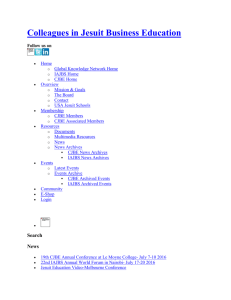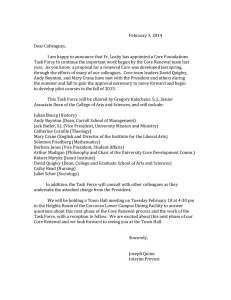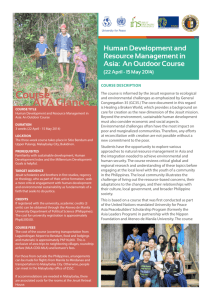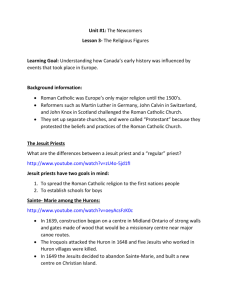A Jesuit University: The Idea of a Jesuit University
advertisement
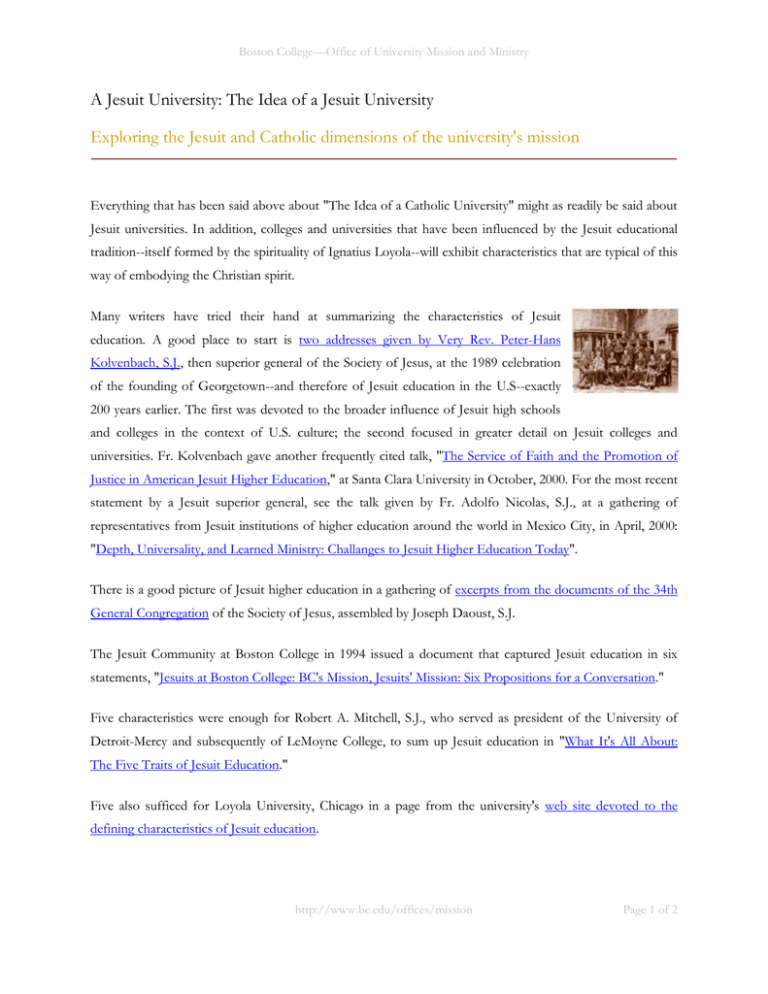
Boston College—Office of University Mission and Ministry A Jesuit University: The Idea of a Jesuit University Exploring the Jesuit and Catholic dimensions of the university's mission Everything that has been said above about "The Idea of a Catholic University" might as readily be said about Jesuit universities. In addition, colleges and universities that have been influenced by the Jesuit educational tradition--itself formed by the spirituality of Ignatius Loyola--will exhibit characteristics that are typical of this way of embodying the Christian spirit. Many writers have tried their hand at summarizing the characteristics of Jesuit education. A good place to start is two addresses given by Very Rev. Peter-Hans Kolvenbach, S.J., then superior general of the Society of Jesus, at the 1989 celebration of the founding of Georgetown--and therefore of Jesuit education in the U.S--exactly 200 years earlier. The first was devoted to the broader influence of Jesuit high schools and colleges in the context of U.S. culture; the second focused in greater detail on Jesuit colleges and universities. Fr. Kolvenbach gave another frequently cited talk, "The Service of Faith and the Promotion of Justice in American Jesuit Higher Education," at Santa Clara University in October, 2000. For the most recent statement by a Jesuit superior general, see the talk given by Fr. Adolfo Nicolas, S.J., at a gathering of representatives from Jesuit institutions of higher education around the world in Mexico City, in April, 2000: "Depth, Universality, and Learned Ministry: Challanges to Jesuit Higher Education Today". There is a good picture of Jesuit higher education in a gathering of excerpts from the documents of the 34th General Congregation of the Society of Jesus, assembled by Joseph Daoust, S.J. The Jesuit Community at Boston College in 1994 issued a document that captured Jesuit education in six statements, "Jesuits at Boston College: BC's Mission, Jesuits' Mission: Six Propositions for a Conversation." Five characteristics were enough for Robert A. Mitchell, S.J., who served as president of the University of Detroit-Mercy and subsequently of LeMoyne College, to sum up Jesuit education in "What It's All About: The Five Traits of Jesuit Education." Five also sufficed for Loyola University, Chicago in a page from the university's web site devoted to the defining characteristics of Jesuit education. http://www.bc.edu/offices/mission Page 1 of 2 Boston College—Office of University Mission and Ministry On the other hand, Stephen C. Rowntree, S.J., who taught philosophy at Loyola University, New Orleans, and now teaches it at the Jesuit house of studies in Harare, Zimbabwe, found it took ten theses to convey an understanding of Jesuit education. See "Ten Theses on Jesuit Higher Education" (America, 28 May 1994). Three points sufficed for Frank H. T. Rhodes, then president of Cornell University, to identify the foundational principles of Jesuit education in the address he delivered at the 1989 Georgetown celebrations, "The Mission and Ministry of Jesuits in Higher Education," (America, 5 August 1989). A very useful view of the fundamental orientations of early Jesuit education, readily translatable to the contemporary scene, is an article by John W. O'Malley, "How the First Jesuits Became Involved in Education," (in The Jesuit Ratio Studiorum: 400th Anniversary Perspectives, ed. Vincent J. Duminuco, S.J., Fordham University Press, 2000). Howard Gray, S.J. has written two articles of note on this topic: "The Experience of Ignatius Loyola" and "Being Catholic in a Jesuit Context." http://www.bc.edu/offices/mission Page 2 of 2
